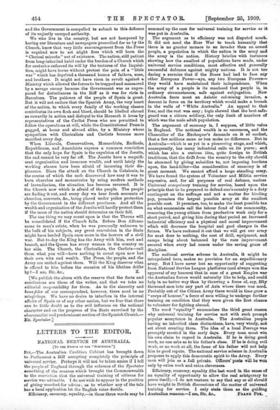LETTERS TO TIIE EDITOR.
NATIONAL SERVICE IN AUSTRALIA.
[To Tim EDITOR 07 THE "SPECTATOR."] SIR,—The Australian Coalition Cabinet has brought down to Parliament a Bill accepting completely the principle of universal service. Perhaps it will not he taken amiss if I tell the people of England through the columni of the Spectator something of the reasons which brought the Commonwealth to the conviction that the universal training of citizens for service was advisable. I do not wish to appear in the position of giving unasked-for advice ; as to whether any of the tale has a local application let the English voter decide.
Efficiency, economy, equality,—in those three words may be summed up the case for universal training for service as it was put in Australia.
The argument as to efficiency was not disputed much. It did not need the Boer War to teach humanity that there is no greater menace to an invader than an armed
people, a, population in which the nation is the army and the army is the nation. History bristles with instances showing how the smallest of populations have made, under universal service conditions, most effective and generally successful defences against mighty nations. It is not too daring a, surmise that if the Boers had had to face any other European Power—aye, any two European Powers-- they would have maintained their independence. When the army of a people is its manhood that people is, in ordinary circumstances, safe against subjugation. Now Australis, fears most an Asiatic colonising invasion, a, descent in force on its territory which world make a breach in the walls of " White Australia." An appeal to that fear, and the rest was easy ; logic showed that the best safe- guard was a citizen soldiery, the only limit of numbers of which was the male adult population.
The argument of economy is, I suppose, of little value in England. The national wealth is so enormous t and the Chancellor of the Exchequer's demands on it so modest, that a few millions more or less make no difference. But in Australia—which is as yet in a pioneering stage, and which, consequently, has many industrial calls on its purse ; and which has also a curious idea, quite foreign to British traditions, that the drift from the country to the city should. be stemmed by giving subsidies to, not imposing burdens upon, the land-tiller—the consideration of economy is of great moment. We cannot afford a large standing army. We have found the system of Volunteer and Militia service expensive, and, for all purposes of real defence, useless Universal compulsory training for service, based upon the principle that to be prepared to defend one's country is a duty contingent on the suffrage and not a matter for hireling pay, promises the largest possible army at the smallest possible cost. It promises, too, to make the least possible tax on what economists call the labour fund of the community, removing the young citizen from productive work only for a abort period, and giving him during that period an increased industrial efficiency and a physical and moral improvement whieh will decrease the hospital and gaol charges in the future. We have reckoned it out that we will get our army for next door to nothing, the cost of drill, equipment, and camps being about balanced by the race improvement secured when every lad comes under the saving grace of discipline.
The national service scheme in Australia, it might be interpolated here, makes no provision for an expeditionary army. But I have never lost an opportunity of suggesting from National Service League platforms (and always won the approval of my hearers) that in case of a great Empire war the Australian forces would naturally like to help, and could help in no better way than by throwing a force of, say, fifty thousand men into any part of Asia where there was need. Probably out of the Citizen Army there would in time grow a "corps of honour," a force of men willing to undergo further training on condition that they were given the first chance to volunteer for fighting abroad.
The word "equality" summarises the third great reason why universal training for service met with such prompt popular acceptance in Australia. • The Australian people having no inherited class distinctions, have, very wisely, not set about creating them. The idea of a local Peerage was promptly scouted in the early days. Every man must win his own claim to regard in Australia. If he is doing good work, no one asks as to his father's class. If he is doing evil work, or no work at all, the fame of his father will not help him to good repute. The national service scheme in Australia proposes to apply this democratic spirit to the Army. Every man will join as a full private. Officers' posts will be won only by extra work and extra cleverness.
Efficiency, economy, equality (the last word in the sense of an equality of opportunity to allow the real aristocracy to prove itself),—I do not venture to say that any or all should have weight in British discussions of the matter of universal training for service. I only state them as the guiding Australian reasons.—I am, Sir, &o., FRANK Fox.










































 Previous page
Previous page